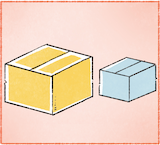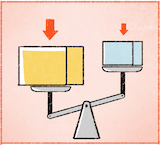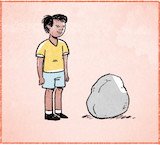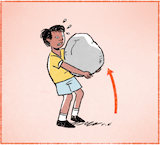



นี้คืออี่หยัง นี้คือกะลัง หลือก่อง
มีก่องใบใหญ่ กับก่องใบน้อย
ก่องใบใหญ่ใบสีเหลียง ก่องใบน้อยใบสีฟ้า วางอยู่ข้างๆ ก่องใบใหญ่
9
เขากำลังเฮ็ดหญัง เขากำลังซั่งน้ำหนัก เขาซั่งน้ำหนักอยู่เทิงตาซั่ง
เขาเอาก่องสองใบไปซั่งน้ำหนัก มีก่องใบน้อย กับก่องใบใหญ่
ก่องอันไหนหนักกว่ากัน ก่องใบใหญ่กะสิหนักกว่า ก่องใบน้อยกะสิบ่หนัก
เพาะว่าก่องใบน้อยมันกะต้องเบาอยู่แล้ว ก่องใบใหญ่มันกะต้องหนักอยู่แล้ว
เพาะสะนั้นแล้ว ก่องอันไหนหนักกว่ากัน ก่องสีเหลียงหนักกว่าก่องสีฟ้า
10
เด็กน้อยพุซายกำลังเฮ็ดหญัง เขากำลังยืนอยู่ เขากำลังยืนแนมก้อนหินอยู่
จักเขาสิเฮ็ดหญัง เขาอาดสิญกก้อนหินนี้ขึ้นกะได้
ก้อนหินนี้เป็นตาหนักบ่ กะสิหนักอยู่ เพาะว่ามันเป็นก้อนหิน ก้อนหินมันหนักบักคักหนึ่ง หนักหลายกะด้อกะเดี้ย
11
เด็กน้อยพุซายเขากำลังเฮ็ดหญัง เขากำลังญกก้อนหินขึ้น
จักเขาญกก้อนหินขึ้นเฮ็ดหญัง เขาอาดสิเอาไปใซ้งานกะได้
ก้อนหินอันนี้หนักบ่ กะสิหนักอยู่ เบิ่งจากสีหน้าของเขาแล้ว เป็นตาหนักหลาย
เขาญกก้อนหินขึ้น เหงี่ยเขากะไหลออกพ้อม เทิงหน้าเขากะเค่งเคียดขึ้นพ้อม มันเป็นตาหนักหลาย เป็นตาหนักบักคักหนึ่ง
แล้วก้อนหินมันกะก้อนใหญ่พ้อม มันบ่ได้ก้อนน้อยๆ ขั้นก้อนน้อยๆ มันกะสิบ่หนัก แต่อันนี้มันก้อนบักใหญ่ มันหน้าสิหนักบักคักหนึ่ง มันเป็นตาหนักกะด้อกะเดี้ย
Link to overview page
Link to dictionary
| Isaan | Pronunciation | Tones | Thai | English/Notes |
|---|---|---|---|---|
| นี้ | ni: | HF | นี้ | 1. this 2. here |
| คือ | khʉ: | HR | คือ | 1. to be, to resemble, like, as 2. why {บักหล้าคือบ่เก็บโต่ะแน่ = [addressing a young boy] Why haven't you cleared the table?} |
| อี่หยัง | i:-yaŋ | H-M | อะไร | 1. what {นี้คืออี่หยัง = What is this?} {มื้อนี้เจ้าเฮ็ดอี่หยัง = What are you doing today?} {กินเข้างายกับอี่หยัง = What did you have for breakfast?} 2. something, anything, (in negations) nothing {บ่ต้องเฮ็ดอี่หยังอีกเลยนอกจากใส่ปุย = [we] don't need to do anything besides adding fertilizer} |
| กะลัง | ga-laŋ | M-HR | ลัง | box, casket, crate |
| หลือ | lʉ: | M | หรือ | or |
| ก่อง | gɔŋ | H | กล่อง | box, case, package |
| มี | mi: | HR | มี | 1. to have 2. there is |
| ใบ | bai | M | ใบ | 1. leaf {ต้นไม้มีใบสีเขียว = the tree has green leaves} 2. banknote {เทิงมีใบพ้อม เทิงมีเหลียนพ้อม = there are notes as well as coins} 3. clf. for leaves, bank notes, helmets, bowls, jars, pots, boxes {ใบบัว = lotus leaf} {ก่องใบน้อย = a small box} {หม้อใบนี้มีฝาพ้อม = the pot here has a lid, too} {ถ้วยใบสีแดง = a red bowl} |
| ใหญ่ | ɲai | H | ใหญ่ | large, big |
| กับ | gap | M | กับ | 1. and {ลุงกับป้า = uncle and aunt} {กวยเตียวหมูกับกวยเตียวไก่ = noodle soup with pork and noodle soup with chicken} 2. with, to {ค้ายๆ กับคำว่า ... = similar to the word ...} 3. prefix in front of foods {กับเข้า = side dishes eaten with rice} {เขากินกับกวยเตียว = he's eating noodle soup} |
| น้อย | nɔ:i | HF | น้อย | 1. few, little 2. small |
| สี | si: | M | สี | 1. color 2. colored pencil, crayon |
| เหลียง | li:aŋ | M | เหลือง | yellow |
| ฟ้า | fa: | HF | ฟ้า | 1. sky {เคี่ยงบินมันกำลังบินขึ้นฟ้า = the airplane is taking off into the sky} 2. color: blue |
| วาง | wa:ŋ | HR | วาง | to place, to set/put down {โทละสับ/phone: วางสาย = to hang up} {มีเกิบวางอยู่ในก่อง = there are shoes in the box} {มือข้างหนึ่งเขาวางอยู่เทิงโต่ะ = he's put one of his hands on the table} |
| อยู่ | yu: | H | อยู่ | 1. to be (located) at 2. yet, still 3. auxiliary indicating continuous or progressive action {ทอดปาอยู่ในกะทะ = (in the process of) frying a fish in the pan} {แม่กำลังเมี้ยนเฮียนอยู่ = mother is cleaning/tidying up the house} |
| ข้าง | kha:ŋ | LF | ข้าง | 1. side {มีหูจับสองข้าง = there are handles on both sides} 2. next to {วางอยู่ข้างๆ ก่องใบใหญ่ = it's placed next to the large box} {เขายืนอยู่ข้างๆ อีกพุหนึ่ง = he's standing next to another person} 3. clf. for body parts which come in pairs (eyes, ears, legs etc.) {เขามีตาสองข้าง = she has two eyes} |
| เขา | khao | M | เขา | personal pronoun: he, she |
| กำลัง | gam-laŋ | M-HR | กำลัง | auxiliary indicating continuous or progressive action |
| เฮ็ด | het | H | ทำ | to do, to make |
| หญัง | ɲaŋ | M | อะไร, เป็นหญัง = ทำไม | 1. what {เขากำลังเฮ็ดหญัง = What is he doing?} {ธูปเอาไว้เฮ็ดหญัง = What are incense sticks for?} 2. something, anything, (nothing) 3. เป็นหญัง[...]คือ in initial position: why {เป็นหญังเขาคือใส่บักพิกลงไปในกวยเตียว = Why is he putting chili in [his] noodle soup?} {เป็นหญังหน้าต่างมันคือเปิด = Why is the window open?} {เป็นหญังมันคือมีควนไฟ = Why is there smoke?} |
| ซั่ง | saŋ | H | ชั่ง | to weigh |
| น้ำหนัก | na:m-nak | HF-M | น้ำหนัก | weight |
| เทิง | thə:ŋ | HR | บน | 1. on, on top of, at, in {เทิงโต่ะ = at/on the table} {กบมันนั่งอยู่เทิงใบบัว = the frog is sitting on the lotus leaf} {เทิงท้องฟ้า = in the sky} {มันแล่นอยู่เทิงลาง = [the train] runs on rails} {มีคนนั่งอยู่เทิงลดสามล้อสามคน = there are three people sitting in the tuk tuk} 2. up, upward Notes: pronunciation: also realized as ทัง |
| ตาซั่ง | ta:-saŋ | M-H | ตาชั่ง | scales, balance (to weigh things) |
| เอา | ao | M | เอา | to take, to give {เขากำลังเอาก่องไปซั่ง = he's taking the boxes to weigh them} {หมอกำลังเอายาให้คนป่วยกิน = the doctor is giving medicine to the patient} {เอาไว้ถ้า = is for, is used for, has the purpose of} |
| สอง | sɔ:ŋ | M | สอง | two |
| ไป | pai | M | ไป | 1. to go 2. auxiliary indicating action extending into the future |
| อัน | an | M | อัน | 1. thing, object 2. general clf. for objects |
| ไหน | nai | M | ไหน | which Notes: Thai loan (Isaan: ใด) |
| หนัก | nak | M | หนัก | heavy |
| กว่า | gwa: | H | กว่า | more, more than, comparative: as, than |
| กัน | gan | M | กัน | mutual, each other, with another, together {เขากำลังนั่งเว้ากัน = they're sitting and talking} {เขาสองคนฮักกัน = they love each other} {ปาสองโตนี้ ใหญ่ห่างกันหลายบ่ = These two fish here, are they very different in size (from each other)?} {ต่างกัน = to be different (from each other)} {ก่องอันไหนหนักกว่ากัน = Which box is heavier (than the other(s))?} |
| กะ | ga | M | ก็ | 1. then, consequently 2. also |
| สิ | si | M | จะ | future tense auxiliary {เขากำลังสิตื่น = he's about to wake up} {สิไปตะหลาด = [I'm] going to the market} |
| บ่ | bɔ: | H | ไม่ | 1. no, not 2. question particle, transforming a statement into a question Notes: spelling exception in line with common usage on social media |
| เพาะว่า | phɔ-wa: | H-H | เพราะว่า | because |
| มัน | man | HR | มัน | it (also used to refer to people) |
| ต้อง | tɔŋ | HF | ต้อง | to have to, must |
| เบา | bao | M | เบา | 1. weight: light 2. soft, gentle 3. volume: quiet/not loud {เปิดเพงเบาๆ = to switch on/listen to a song at moderate volume} |
| แล้ว | lɛ:o | HF | แล้ว | 1. finished 2. already 3. and then, and next (especially แล้วกะ) 4. auxiliary for past tense |
| เพาะสะนั้นแล้ว | phɔ-sa-nan-lɛ:o | H-M-HF-HF | เพราะฉะนั้นแล้ว | therefore, for that reason, consequently Notes: pronunciation: also realized as เพาะฉะนั้น |
| เด็กน้อย | dek-nɔ:i | M-HF | เด็ก, เด็กน้อย | child |
| พุซาย | phu-sa:i | H-HR | ผู้ชาย | man, male |
| ยืน | yʉ:n | M | ยืน | to stand |
| แนม | nɛ:m | HR | มอง | to look, to glance, to stare {เขากำลังยืนแนมก้อนหินอยู่ = he's standing and looking at the stone/rock} {ข้างหนึ่งแนมเห็น อีกข้างหนึ่งแนมบ่เห็น = [we] see one side, [we] can't/don't see the other side} |
| ก้อนหิน | gɔ:n-hin | HF-M | ก้อนหิน | stone |
| จัก | jak | M | จัก | 1. answer to a question: [I] don't know, don't know exactly, [I'm] not sure {พุซายคนนี้เขาเถ้าไป่ จัก จักเถ้าหลือบ่เถ้า เบิ่งบ่ค่อยออก = Is this man here already old? I don't know. I can't see clearly whether he's old or not.} {เขาเว้ากันอยู่ใส จักคือกัน = Where are they talking? I don't know either.} 2. exact(ly), what exactly {จักต้มอี่หยังกะบ่ฮู้ = I don't know what (exactly) he is cooking} {บ่ลู้คือกันจักปาอี่หยัง = I don't know either what kind of fish this is} 3. how much/many? {ต้นไม้มีจักต้น = How many trees are there?} {ตอนนี้จักโมงแล้ว = What time is it now?} {มือของเฮานี้สิมีจักนิ้ว = How many fingers do our hands have?} 4. a bit, a little bit {จักหน่อย/จักหน่อยหนึ่ง = a bit, a little bit} |
| อาด | a:t | LF | อาจ | 1. might, may, will 2. likely |
| ญก | ɲok | H | ยก | 1. to raise {ญกมือขึ้น = to raise the hand} {ญกโตอย่าง = to give an example} 2. to lift {เขากำลังญกก้อนหินขึ้น = he's lifting up the stone} |
| ขึ้น | khʉn | LF | ขึ้น | 1. to go up, to increase 2. sun: to rise {ตะเว็นกำลังขึ้น = the sun is rising} 3. more 4. bus/train etc.: to get on, to board {พุโดยสานขึ้นลดไฟเบิดแล้ว = all passengers have boarded the train} |
| ได้ | dai | HF | ได้ | 1. can 2. to get, to obtain 3. before verb: indicating past tense 4. บ่ได้ + verb: not |
| เป็น | pen | M | เป็น | 1. to be, to exist 2. to be able to 3. to suffer, sth. happens to 4. เป็นหญัง[...]คือ in initial position: why? {เป็นหญังเขากะคือแปงฟัน = Why is he brushing his teeth?} {เป็นหญังเคี่ยงบินมันคือสิตก = Why is the airplane falling down?} |
| ตา | ta: | M | ตา | as a prefix: likely, worthy, fit for (like Thai น่า-) {ตาฮัก = lovely/cute} {ตาสะออน = praiseworthy} {ตาหวาน = (of ice cream) [likely to be] sweet} {ตาอยู่ = to be a good place to be} Notes: see also various entries for ตา-, e.g., ตาแซบ, ตาพู่ฮ้าย, ตาย้าน, ตาอยากหัว, ตาฮัก, ตามีแฮง |
| บักคักหนึ่ง | bak-khak-nʉŋ | M-H-H | intensifier: very, very much (variant of คัก) | |
| หลาย | la:i | M | เยอะ, มาก | many, much, very |
| กะด้อกะเดี้ย | ga-dɔ:k-ga-di:a | M-HF-M-HF | มากมาย, มากเกินไป | intensifier: very, very much |
| ใซ้งาน | sai-ŋa:n | HF-HR | ใช้งาน | to use, to put to use |
| เบิ่ง | bəŋ | H | ดู | 1. to look at, to see, to watch {เบิ่งโทละทัด = to watch TV} {เบิ่งหนัง = to watch a movie} 2. to guess {เบิ่งซงแล้ว ... = [I] guess / from what it looks like ...} |
| จาก | ja:k | LF | จาก | 1. from {... เฮ็ดมาจากอี่หยัง = ... is made from what?} 2. to depart |
| สีหน้า | si:-na: | M-LF | สีหน้า | face, facial expression |
| ของ | khɔ:ŋ | M | ของ | of, belonging to |
| เหงี่ย | ŋi:a | H | เหงื่อ | sweat |
| ไหล | lai | M | ไหล | to flow |
| ออก | ɔ:k | LF | ออก | 1. to go out, to leave 2. out |
| พ้อม | phɔ:m | HF | พร้อม | at the same time, also, too {มีตะเว็นพ้อม = the sun's out, too} {กะทะมีด้ามพ้อม = the pan has also a handle} |
| เทิง | thə:ŋ | HR | ทั้ง | 1. up to, all, all of, the whole of, altogether {เขาใส่กางเกงขาสั้นเทิงสองคน = both are wearing short trousers} {เขาเป็นพ่อของลูกเทิงสามคนนี้ = he's the father of these three [children] here} 2. เทิง ... เทิง ...: both ... and ..., ... as well as ... {เทิงมีใบพ้อม เทิงมีเหลียนพ้อม = there are notes as well as coins} Notes: pronunciation: also realized as ทัง |
| หน้า | na: | LF | หน้า | 1. front {ปะตูหน้า = front door} 2. face {เขากำลังล้างหน้า = he's washing his face} 3. auxiliary: conditional tense {เขาหน้าสิเป็นพุบ่าวพุสาวกัน = they are probably groom and bride} {กะหน้าสิส้มอยู่ = it's likely to be sour} 4. season {หน้าฮ้อน = hot season} 5. page 6. clf. for pages {เฮาอ่านฮอดหน้านั้นแล้ว = we've read until this page} |
| เค่งเคียด | kheŋ-khi:at | H-HF | เคร่งเครียด | 1. tense 2. serious |
| ก้อน | gɔ:n | HF | ก้อน | 1. piece, lump, mass, chunk 2. clf. for bars of soap, stones, clouds, ice cubes |
| ขั้น | khan | LF | เมื่อ | when, if |
| แต่ | tɛ: | H | แต่ | 1. but {แต่บ่ต่างกันหลาย = but not very different} {แต่บ่ลู้ว่าเขาญ่างมาแต่ใส = but [I] don't know where he's coming from, see also: แต่ว่า} 2. only {ตอนนี้มีแต่ขี้ฝ้า = now there are only clouds} |
| บัก | bak | M | 1. intensifier before adjectives {ปาโตบักใหญ่ = a (very) large fish} 2. prefix in front of fruits and vegetables {บักแตงโม = watermelon} 3. can be used as a reference for a male person of the same or younger age {บักอันนี้ = this lad} |